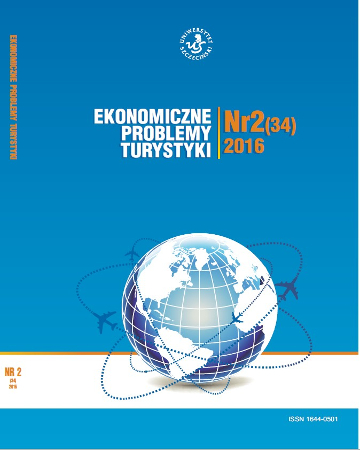
ISSN: 1644-0501
eISSN: 2353-3188
OAI
DOI: 10.18276/ept.2016.2.34-28



Issue archive /
nr 2 (34) 2016
Zdolność do absorpcji wiedzy w przedsiębiorstwach turystycznych – identyfikacja znaczenia i możliwości pomiaru
(Absorptive Capacity in Tourism Enterprises – The Significance and Measurement Possibilities)
| Authors: |
Marcin
Olszewski
Uniwersytet Ekonomiczny w Poznaniu Marlena Bednarska Uniwersytet Ekonomiczny w Poznaniu |
| Keywords: | absorptive capacity knowledge tourism industry |
| Whole issue publication date: | 2016 |
| Page range: | 13 (331-343) |
Abstract
The knowledge-based view suggests that the extent of knowledge transfer from knowledge generators to knowledge recipients may depend on recipients’ absorptive capacity ie. “ability of a firm to recognize the value of new, external information, assimilate it, and apply it to commercial ends” [Cohen and Levinthal 1990, p. 128]. The lack or insufficiency of absorptive capacity in a firm hinders the ability to recognize the potential of new ideas arising from interaction with other external knowledge generators. The purpose of this article is to identify the importance of the absorptive capacity in tourism industry, as well as methods of its conceptualization and operationalization. The results include systematization of existing research dedicated to absorptive capacity in tourism and propositions of further studies on this subject.
Download file
Article file
Bibliography
| 1. | A. Booth, D. Papaioannou, A. Sutton, Systematic Approaches to a Successful Literature Review, Sage, London, 2012. |
| 2. | M. Brookes, The dynamics and evolution of knowledge transfer in international master franchise agreements, International Journal of Hospitality Management 2014, vol. 36, s. 52– 62. |
| 3. | W. M. Cohen, D. A. Levinthal, Absorptive Capacity: A New Perspective on Learning and Innovation, Administrative Science Quarterly 1990, vol. 35, no. 1, s. 128-152. |
| 4. | A. Escribanoa, A. Fosfurib, Josep A. Tribó, Managing external knowledge flows: The moderating role of absorptive capacity, Research Policy 2009, vol. 38, s. 96-105. |
| 5. | T. Flatten, Greve G., M. Brettel, Absorptive Capacity and Firm Performance in SMEs: The Mediating Influence of Strategic Alliances, European Management Review 2011,vol. 8, no. 3, s. 137-152. |
| 6. | B. Gallupe, Knowledge management systems: surveying the landscape, International Journal of Management Reviews 2001, vol. 3, no. 1, s. 61-77. |
| 7. | H. M. A Herath, R. Mahmood, Strategic Orientations and SME Performance: Moderating Effect of Absorptive Capacity of the Firm, Asian Social Science 2014, vol. 10, no. 13, s. 95-107. |
| 8. | H. Hoarau, Knowledge Acquisition and Assimilation in Tourism- Innovation Processes, Scandinavian Journal of Hospitality and Tourism 2014, vol. 14, no. 2, s. 135-151. |
| 9. | M. M. Jiménez-Barrionuevo, V. J. García-Morales, Validation of an instrument to measure absorptive capacity, Technovation 2011, vol. 31, s. 190-202. |
| 10. | P.-A. Julien, E. Andriambeloson, C. Ramangalahy, Networks, weak signals and technological innovations among SMEs in the land-based transportation equipment sector, Entrepreneurship and Regional Development 2004, vol. 16, iss. 4, s. 1-19. |
| 11. | W. Keller, Absorptive capacity: On the creation and acquisition of technology in development, Journal of Development Economics 1996, vol. 49, no. 1, s. 199-227. |
| 12. | L Kim, The dynamics of Samsung's technological learning in semiconductors, California Management Review 1997, vol. 39, no. 3, s. 86-100. |
| 13. | U. Kumar, V. Kumar, D.de Grosbois, Development of Technological Capability by Cuban Hospitality Organizations, International Journal of Hospitality Management 2008, vol. 27, iss. 1, s. 12-22. |
| 14. | A. Muscio, The impact of absorptive capacity on SMEs collaboration, Economics of Innovation and New Technology 2007, vol. 16, s. 653-668. |
| 15. | J. Nieves, A. Quintana, J. Osorio, Knowledge-based resources and innovation in the hotel industry, International Journal of Hospitality Management 2014, vol. 38, s. 65-73. |
| 16. | I. Nonaka, The knowledge-creating company, [w]: Harvard Business Review on Knowledge Management, Harvard Business School Press, 1998, s. 21-45. |
| 17. | L. Pace, How do tourism firms innovate for sustainable energy consumption? A capabilities perspective on the adoption of energy efficiency in tourism accommodation establishments Journal of Cleaner Production 2015, s. 1-12. |
| 18. | G. Shaw, Tourism networks, knowledge dynamics and co-creation. [w:] M. McLeod i R. Vaughan (red.), Knowledge networks and tourism, Routledge, London, 2015, s. 45–61. |
| 19. | R. Thomas, E. Wood, Innovation in tourism: Re-conceptualising and measuring the absorptive capacity of the hotel sector, Tourism Management 2014, vol. 45, s. 39–48. |
| 20. | R. Thomas, E. Wood, The absorptive capacity of tourism organisations, Annals of Tourism Research 2015, vol. 54, s. 84–99. |
| 21. | N. Tzokas, Y. A. Kim, H. Akbar, H. Al-Dajani, Absorptive capacity and performance: The role of customer relationship and technological capabilities in high-tech SMEs, Industrial Marketing Management 2015, vol. 47, s. 134-142. |
| 22. | N. Valentina, G. Passiante. Impacts of absorptive capacity on value creation, Anatolia: An International Journal of Tourism and Hospitality Research 2009, vol. 20, no. 2, s. 269–287. |
| 23. | Y. Wang, Examining the Level of Sophistication and Success of Destination Marketing Systems, Journal of Travel & Tourism Marketing 2008, vol. 24, no. 1, s. 81-98. |
| 24. | K. P. Wensley, J. G. C. Navarro, Overcoming knowledge loss through the utilization of an unlearning context, Journal of Business Research 2015, vol. 68, s. 1563–1569. |
| 25. | P. Yeoh, Realized and potential absorptive capacity: Understanding their antecedents and performance in the sourcing context, Journal of Marketing Theory and Practice 2009, vol. 17, no. 1, s. 21-36. |
| 26. | S. A. Zahra, G. George, Absorptive capacity: A review, reconceptualization, and extension, Academy of Management Review 2002, vol. 27, no. 2, s. 185–203. |
| 27. | U. Zander, B. Kogut, Knowledge and the speed of the transfer and imitation of organizational capabilities: An empirical test, Organization Science 1995, vol. 6, no. 1, s. 76-92. |